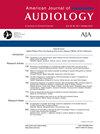听觉和语言发展的不同步与儿童语音缺陷的隐性联系。
IF 1.8
4区 医学
Q3 AUDIOLOGY & SPEECH-LANGUAGE PATHOLOGY
引用次数: 0
摘要
半个世纪以来,心理语言学家一直在探索发育性语言障碍可能源于阈上听觉功能障碍的观点,但结果并不确定。典型的研究侧重于测试时的时间处理能力与各种语言技能测量之间的关系,这是一种近端解释。本研究通过测试三个新的假设来扩展研究重点:(a)频谱处理障碍可能比时间处理障碍更容易导致语言学习障碍。(b) 语音敏感性可能是受听觉(功能)障碍影响最大的特定语言技能。(c) 在年幼时观察到的不良听觉功能可能会全部或部分恢复,从而降低这些恢复的功能与年长时持续的语言技能之间的关系。本文章由计算机程序翻译,如有差异,请以英文原文为准。
Asynchronies in Auditory and Language Development Obscure Connections to Phonological Deficits in Children.
For half a century, psycholinguists have been exploring the idea that developmental language disorders may have their roots in suprathreshold auditory dysfunctions, but results are inconclusive. Typical studies focus on relationships between temporal processing abilities and measures of various language skills at the time of testing, a proximal account. This study expanded that focus by testing three novel hypotheses: (a) Spectral processing impairments may be more responsible for language-learning deficits than temporal processing impairments. (b) Phonological sensitivity is likely the specific language skill most strongly affected by auditory (dys)functions. (c) Poor auditory functioning observed at young ages may wholly or partly recover, reducing the magnitude of relationship between those recovered functions and persistent language skills at older ages.
求助全文
通过发布文献求助,成功后即可免费获取论文全文。
去求助
来源期刊

American Journal of Audiology
AUDIOLOGY & SPEECH-LANGUAGE PATHOLOGY-OTORHINOLARYNGOLOGY
CiteScore
3.00
自引率
16.70%
发文量
163
审稿时长
>12 weeks
期刊介绍:
Mission: AJA publishes peer-reviewed research and other scholarly articles pertaining to clinical audiology methods and issues, and serves as an outlet for discussion of related professional and educational issues and ideas. The journal is an international outlet for research on clinical research pertaining to screening, diagnosis, management and outcomes of hearing and balance disorders as well as the etiologies and characteristics of these disorders. The clinical orientation of the journal allows for the publication of reports on audiology as implemented nationally and internationally, including novel clinical procedures, approaches, and cases. AJA seeks to advance evidence-based practice by disseminating the results of new studies as well as providing a forum for critical reviews and meta-analyses of previously published work.
Scope: The broad field of clinical audiology, including audiologic/aural rehabilitation; balance and balance disorders; cultural and linguistic diversity; detection, diagnosis, prevention, habilitation, rehabilitation, and monitoring of hearing loss; hearing aids, cochlear implants, and hearing-assistive technology; hearing disorders; lifespan perspectives on auditory function; speech perception; and tinnitus.
 求助内容:
求助内容: 应助结果提醒方式:
应助结果提醒方式:


